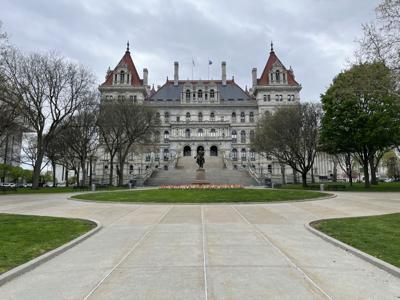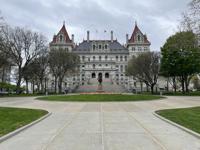ALBANY — State Sen. Mark C. Walczyk and Assemblywoman Mary Beth Walsh have teamed up behind a bill that would undo the shift of some local elections into even years signed into law by Gov. Kathy Hochul just weeks ago.
In a bill introduced in the last week of 2023, Walczyk and Walsh put forward a plan that would return the elections for local seats like county legislator, town supervisor or council member and some local department supervisor positions to the odd years they have historically occurred in.
Democrats supported the bill, ushered it through the state Legislature and secured the Governor’s signature last year with the argument the change would increase public participation in local elections.
While town and county elections have seen low turnout, especially in the last few decades, the even-year elections frequently see higher turnout, as higher offices like state Legislature, Governor, the U.S. Congress and President are on the ballot then as well.
Democrats tend to do better in those national elections in New York as well, considering there are at least twice as many registered Democrats as Republicans in New York, and the state’s large unregistered or third-party voting base trends to vote for Democratic candidates as well.
Walczyk said the move devalued New York’s democratic principles by devaluing local issues against the national ones they will have to compete with for voter attention.
“I wasn’t elected to stand by while self-serving politicians disrespect our local governments for their own personal political gain.”
But Democrats have said the low turnout is a symptom of voter fatigue, asking people to take time off and closely follow political issues again and again year after year. The bill to make the switch was introduced last year in the Senate by Senator James Skoufis, D-Middletown.
“Local issues do not get the attention they deserve when only 15% or 20% of people turn out to vote, the turnout does these issues a grave disservice,” he said in a press release last November, defending the bill in over requests the Governor veto it. “The turnout does those issues a grave disservice.”
But Walsh said voters will now be overwhelmed by competing issues, pitting national issues against the most local in their media consumption and asking voters to focus on the whole range of the political spectrum at once.
“It’s a disservice to our constituents to dilute the focus on local concerns with the noise of larger-scale, media-fueled national elections,” she said.
The bill has little chance of passing the Democratic-controlled legislature. A similar proposal, an amendment put forward by Senate Republicans failed on Monday by a party-line vote. Another proposal put forward that day which failed was a Republican-led effort to require voters provide identification to vote at a ballot box.
“Many of the recent election law changes passed by my Democratic colleagues do not seem to be about improving our democracy or serving the best interests of voters,” said state Sen. Daniel G. Stec in a press release after the votes. “Rather, they seem designed to consolidate and retain their own political power.”
Stec said he supported both amendments, and believes the voter ID requirement is a necessary election security measure.
“We require ID for a host of other everyday activities, like buying cough syrup or visiting a school. Providing identification before casting a vote is essential to election integrity and just makes sense.”
Under the current law, registered voters don’t need to provide ID when they check in to vote at a polling site for primary or general elections, unless they failed to provide identification when they first registered, and federal ID requirements exist when someone votes in a federal general election for the first time. Voting by absentee ballot does not require identification.
Voter fraud is not a major issue identified within New York elections, outside of isolated individual incidents. The most prominent issues regarding election integrity in New York have involved elections officials, like the Oneida County Board of Elections that misplaced and miscounted mail-in ballots in the race between Claudia L. Tenney and Anthony J. Brindisi in 2020.
Early last year, the Republican appointees to the Rensselaer County Board of Election were caught up in allegations of voter fraud aimed at neutralizing the power of the Working Families party in that Capital Region county, to assist Republican County Executive Steven F. McLaughlin. The Republican election commissioner pleaded guilty to 12 counts of voter fraud in Jan. 2023, and his former deputy commissioner resigned ahead of the announcement of a federal grand jury inquiry into her conduct in October.









